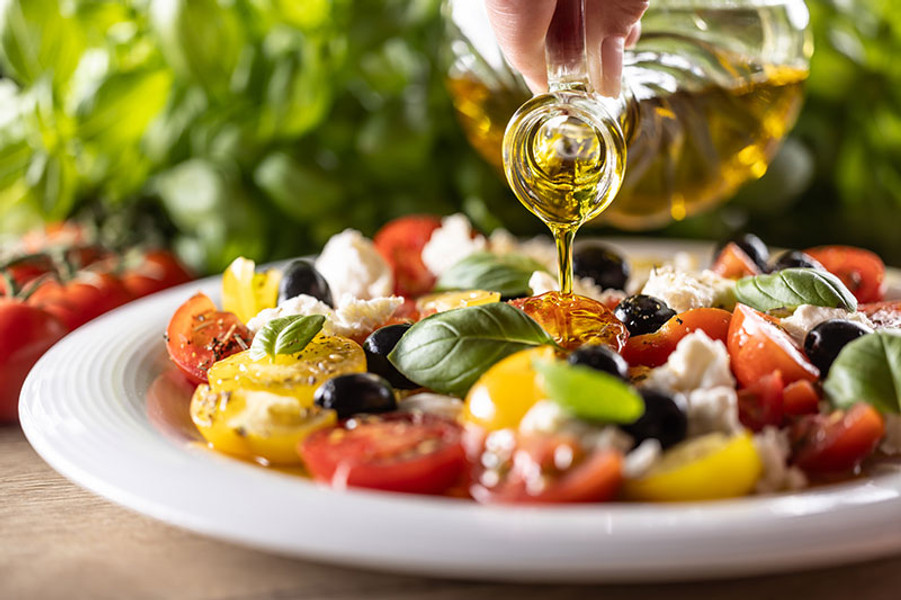Mediterranean-Style Diet: Eat Good Feel Great!
Posted by Fresh Harvest Market on 6th Nov 2024
Unveiling the Secrets of a Healthy Diet: Understanding Good Carbs, Bad Carbs, Good Fats, and Bad Fats in Mediterranean-Style Eating
In a world inundated with dietary advice, the terms "good carbs" and "bad carbs," as well as "good fats" and "bad fats," often dominate the conversation. Understanding these distinctions is crucial for making informed choices about our nutrition. One dietary approach that has gained widespread acclaim is the Mediterranean-style diet, renowned for its emphasis on healthy fats and nutritious carbohydrates. In this comprehensive guide, we'll delve into the intricacies of good and bad carbs, good and bad fats, and explore why the Mediterranean diet stands out in promoting overall well-being.
The ABCs of Good Carbs vs. Bad Carbs
Unraveling the Mystery of Good Carbs
Good carbs, often referred to as complex carbohydrates, are the unsung heroes of a balanced diet. Found in foods like whole grains, legumes, and vegetables, these carbohydrates are rich in fiber, promoting sustained energy release. Fiber also aids in digestion and helps maintain a healthy weight by promoting a feeling of fullness.
Navigating the Terrain of Bad Carbs
On the flip side, bad carbs, or simple carbohydrates, are often associated with refined sugars and processed foods. These quickly digestible carbs can lead to rapid spikes in blood sugar levels, contributing to weight gain and increasing the risk of chronic diseases.
Decoding the World of Good Fats vs. Bad Fats
The Marvels of Good Fats
Contrary to the outdated notion that all fats are harmful, good fats are essential for our health. Found in olive oil, avocados, and fatty fish like salmon, these monounsaturated and polyunsaturated fats play a crucial role in supporting heart health, reducing inflammation, and even aiding in weight loss.
Steering Clear of Bad Fats
Bad fats, often trans fats and saturated fats, have earned their notoriety for contributing to cardiovascular issues. Foods high in bad fats include fried items, processed snacks, and certain animal products. Limiting the intake of these fats is vital for maintaining a healthy heart and overall well-being.
Embracing the Mediterranean-Style Diet
The Heart of the Matter: Healthy Fats
Central to the Mediterranean diet is the consumption of healthy fats, particularly from olive oil. Olive oil is not only a staple in Mediterranean cuisine but also a key contributor to the diet's cardiovascular benefits. Incorporating olive oil into daily meals can lead to improved cholesterol levels and a reduced risk of heart disease.
Wholesome Carbs for Sustained Energy
Mediterranean-style eating places emphasis on whole grains, legumes, and fresh fruits and vegetables. These wholesome carbs provide essential nutrients, fiber, and antioxidants, promoting overall health and vitality.
Serving Up Success: Practical Tips for a Mediterranean-Inspired Lifestyle
1. Olive Oil Elegance: Replace butter with extra virgin olive oil for a heart-healthy alternative in cooking.
2. Go Whole Grain: Opt for whole grains like quinoa, brown rice, and whole wheat pasta to boost your intake of good carbs.
3. Fruit Fiesta: Incorporate a variety of fruits into your daily diet for a sweet and nutritious treat.
4. Fishy Business: Enjoy fatty fish, such as salmon and mackerel, at least twice a week for a dose of omega-3 fatty acids.
5. Vegetable Variety: Create colorful, nutrient-packed meals by including a diverse range of vegetables in your daily menu.
he distinction between good and bad carbs, good and bad fats, holds the key to unlocking optimal health. The Mediterranean-style diet serves as a beacon of balanced nutrition, emphasizing the importance of incorporating healthy fats and nutritious carbohydrates into our daily lives. By adopting the principles of this time-tested dietary approach, we pave the way for improved well-being, one delicious and wholesome meal at a time.

